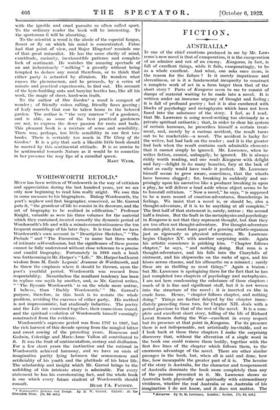WORDSWORTH RETOLD.*
Mum has been written of Wordsworth in the way of criticism and appreciation during the last hundred years, yet we are only now beginning to read him really aright. We owe this in some measure to his biographers. Bishop Wordsworth, the poet's nephew and first biographer, conceived, as Mr. Garrod puts it, "the grandeur of life to consist in its decorum, and the art of biography to be realized in edification." Professor Knight, valuable as were his three volumes for the material which they contained, treated cursorily the dynamic period of Wordsworth's life and with a minute conscientiousness the too frequent mumblings of his later days. It is true that we -have Wordsworth's own account in " Descriptive Sketches," "The Prelude " and " The Excursion," to name but three works of intimate self-confession, but the significance of these poems cannot be fully understood without close reference to a precise and candid biography. Fortunately in 1916 such a book was forthcoming in Mr. Harper's " Life." Mr. Harper had learnt wisdom from M. kmile Legouis' Jeunesse de Wordsworth, and he threw the emphasis where it should be thrown, upon the poet's youthful period. Wordsworth was rescued from respectability. Nevertheless the resultant tendency has been to replace one myth by another, and, as Mr. Garrod writes, " "Ihe Byronic Wordsworth ' is on the whole more untrue, I believe, than ' Daddy Wordsworth.' " Mr. Garrod's purpose, therefore, in this book is to restate the whole problem, avoiding the excesses of either party. His method is not impressionistic, but studiously inductive.. The poetry and the Life are examined together, their connexions traced, and the spiritual evolution of Wordsworth himself cunningly constructed from the evidence.
Wordsworth's supreme period was from 1797 to 1807, but the rich harvest of this decade sprang from the mingled bitter and sweet sowing of the preceding years. Rousseau and Godwin, Coleridge and Marie-Anne Vallon all contributed to it. It was the fruit of sentimentalism, ecstasy and disillusion. For a few short years the instinctive and the rational in Wordsworth achieved harmony, and we have an oasis of imaginative purity lying between the sensuousness and artificiality of his youth and the platitude of his later life. The scholarship and insight which Mr. Garrod brings to the unfolding of this intricate story is admirable. For every statement he has his corroborating fact, and the whole book is one which every future student of Wordsworth should
• Wordsworth's lectures and Essays. By II. W. Garrod. Oxford : At the
Clarendon Press. Od. net.]










































 Previous page
Previous page